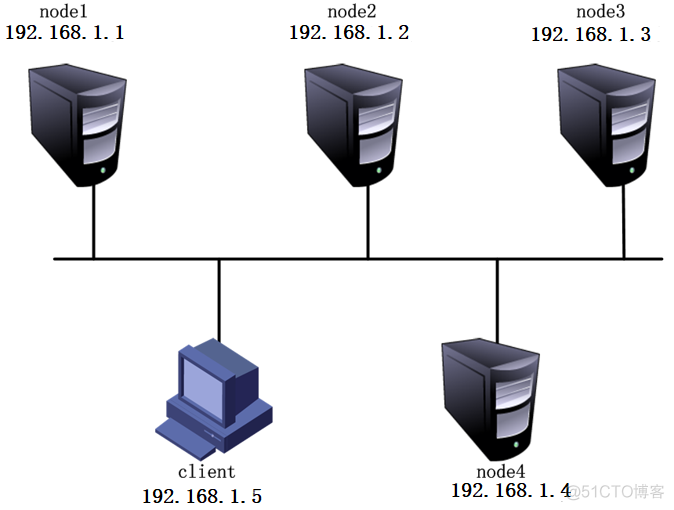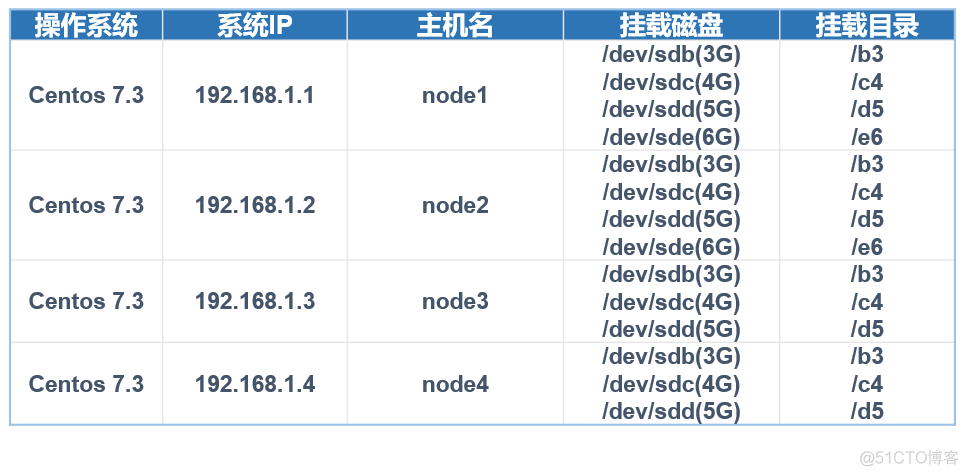博文大纲:(一)GlusterFS相关概念。(二)GlusterFS各种卷类型的部署及客户端挂载使用。(三)GlusterFS维护命令。
(一)GlusterFS相关概念:
GlusterFS是一个开源的分布式文件系统,同时也是Scale-Out存储解决方案Gluster的核心,在存储数据方面有强大的横向扩展能力。GlusterFS主要由存储服务器、客户端及NFS/Samba存储网关(可选组件)组成。GlusterFS架构中最大的设计特点是没有元数据服务器组件,也就是说没有主/从服务器之分,每一个节点都可以是主服务器。
1)Gluster相关参考文档如下(我下面的配置是基于本地yum配置的,若需要搭建最新版本,可直接按照下面的文档链接进行配置):
Gluster官网 ,基于centos7/Redhat安装Gluster官方文档
2) GlusterFS相关术语:
- Brick(存储块):指可信主机池中由主机提供的用于物理存储的专用分区。
- Volume(逻辑卷):一个逻辑卷是一组Brick的集合。卷是数据存储的逻辑设备。
- FUSE:是一个内核模块,允许用户自己创建文件系统,无须修改内核代码。
- Glusterd(后台管理进程):在存储群集中的每个节点上都要运行。
- VFS:内核空间对用户空间提供的访问磁盘的接口。
3)GlusterFS的卷类型:
- 分布式卷:相当于Windows中的跨区卷,只是扩大了磁盘空间,不具有容错能力;
- 条带卷:相当于Windows中的带区卷,属于RAID 0级别,一份文件会在多个磁盘上进行读写,文件越大,读写效率越高,但不具有容错能力;
- 复制卷:相当于Windows中的镜像卷,属于RAID 1级别,具有容错能力,读性能高,但写性能下降,因为要将同一份文件同步写入在多个Brick上。
- 分布式条带卷:brick server数量是条带数(数据块分布的brick数量)的倍数,兼具分布式卷和条带卷的特点。
- 分布式复制卷:brick server数量是镜像数(数据副本数量)的倍数,兼具分布式卷和复制卷的特点。
- 条带复制卷:类似于RAID 10,同时具备条带卷和复制卷的特点。
- 分布式条带复制卷:三种基本卷的复合卷,通常用于map reduce应用。
在以上几种卷类型中,有些可能无法理解透彻,但是没关系,在生产环境中,大多数公司考虑到磁盘的利用率,会使用RAID5,或者RAID 10,关于RAID 5卷的配置可以参考:GlusterFS Dispersed Volume(纠错卷)总结。
4)下面介绍GlusterFS一些卷类型的特点(不包括RAID5):
1、分布式卷(类似Windows中的跨区卷):
分布式卷是GlusterFS的默认卷,在创建卷时,默认选项是创建分布式卷。在该模式下,并没有对文件进行分块处理,文件直接存储在某个server节点上。
分布式卷具有如下特点:
- 文件分布在不同的服务器,不具备冗余性。
- 更容易且廉价地扩展卷的大小。
- 单点故障会造成数据丢失。
- 依赖底层的数据保护。
2、条带卷(类似Windows中的带区卷,也称为RAID 0):
stripe模式相当于RAID 0,在该模式下,根据偏移量将文件分成N块(N个条带节点),轮询地存储在每个Brick Server节点。节点把每个数据块都作为普通文件存入本地文件系统,通过扩展属性记录总块数和每块的序号。在配置时指定条带数必须等于卷中Brick 所包含的存储服务器数,在存储大文件时,性能尤为突出,但是不具备冗余性。
条带卷具有如下特点:- 数据被分割成更小块分布到块服务器群中的不同条带区。
- 分布减少了负载且更小的文件加速了存取的速度。
- 没有数据冗余。
3、复制卷(类似于Windows中的镜像卷,也称为RAID 1)
复制模式,即同一文件保存一份或多份副本,每个节点上保存相同的内容和目录结构。复制模式因为要保存副本,所以磁盘利用率较低,如果多个节点上的存储空间不一致,那么将按照木桶效应取最低节点的容量作为该卷的总容量。复制卷具有冗余性,即使一个节点损坏,也不影响数据的正常使用。
复制卷具有如下特点:- 卷中所有的服务器均保存一个完整的副本。
- 卷的副本数量可由客户创建的时候决定。
- 至少有两个块服务器或更多服务器。
- 具备冗余性。
4、分布式复制卷(也称为RAID 10):
分布式复制卷兼顾分布式卷和复制卷的功能,主要用于需要冗余的情况下。
(二)GlusterFS各种卷类型的部署及客户端挂载使用:
我这里的环境如下:

服务器相关信息:

磁盘相关信息:

一、部署前准备:1、在所有节点执行以下操作:根据上表中添加磁盘,通过fdisk命令进行分区,mkfs格式化,创建相应的挂载目录,并将格式化的磁盘挂载到相应的目录中,最后修改/etc/fstab配置文件,使其永久挂载,具体配置可以参考我之前的博文:centos 7.3创建、挂载及卸载(包括自动挂载)文件系统。(我这里主要目的是做个相关笔记,所以磁盘大小不以实际环境为准,可以根据自己的实际环境进行磁盘分区)
2、自己配置防火墙和selinux,我这里为了方便,直接关闭了。
3、下载我提供的本地yum仓库,并上传至各个节点服务器。
二、开始部署:
1、node1配置如下:
[root@node1 ~]# vim /etc/hosts #写入末尾四行,以便添加4个节点的解析 127.0.0.1 localhost localhost.localdomain localhost4 localhost4.localdomain4 ::1 localhost localhost.localdomain localhost6 localhost6.localdomain6 192.168.1.1 node1 192.168.1.2 node2 192.168.1.3 node3 192.168.1.4 node4 [root@node1 ~]# mount /dev/cdrom /media #挂载我提供的yum仓库 mount: /dev/sr0 写保护,将以只读方式挂载 [root@node1 ~]# rm -rf /etc/yum.repos.d/* #删除或移走原有yum配置文件 [root@node1 ~]# yum clean all #清除yum缓存 [root@node1 ~]# vim /etc/yum.repos.d/a.repo #编辑yum配置文件,写入以下内容 [fd] baseurl=file:///media gpgcheck=0 #写完以上三行,保存退出即可。 [root@node1 ~]# yum -y install glusterfs glusterfs-server glusterfs-fuse glusterfs-rdma #安装GlusterFS软件 [root@node1 ~]# systemctl start glusterd #启动该服务 [root@node1 ~]# systemctl enable glusterd #设置为开机自启动2、node2配置如下:
[root@node2 ~]# scp root@192.168.1.1:/etc/hosts /etc/ #将node1的hosts配置文件复制过来 The authenticity of host 192.168.1.1 (192.168.1.1)cat be established. ECDSA key fingerprint is SHA256:BS+lKMN05pYF3F1XeIYU69VnHjzKBiBiMZ1SDKgsxxs. ECDSA key fingerprint is MD5:ba:0b:a7:47:55:01:6f:41:41:5f:ee:b8:88:bf:7a:60. Are you sure you want to continue connecting (yes/no)? yes #输入“yes” Warning: Permanently added '192.168.1.1' (ECDSA) to the list of known hosts. root@192.168.1.1s password: #输入对方用户名的密码 hosts 100% 230 286.9KB/s 00:00 [root@node1 ~]# rm -rf /etc/yum.repos.d/* #删除或移走原有yum配置文件 [root@node1 ~]# yum clean all #清除yum缓存 [root@node2 ~]# scp root@192.168.1.1:/etc/yum.repos.d/a.repo /etc/yum.repos.d/ #将node1的yum文件复制过来 root@192.168.1.1s password: a.repo 100% 38 31.1KB/s 00:00 [root@node2 ~]# mount /dev/cdrom /media #挂载我提供的yum仓库 mount: /dev/sr0 写保护,将以只读方式挂载 [root@node1 ~]# yum -y install glusterfs glusterfs-server glusterfs-fuse glusterfs-rdma #安装GlusterFS软件 [root@node1 ~]# systemctl start glusterd #启动该服务 [root@node1 ~]# systemctl enable glusterd #设置为开机自启动至此,node2配置完成了,node3、node4重复node2的配置即可,我这就不写了,请自行配置。
3、添加节点(接下来的所有配置,在任意一台节点上执行即可,我这里在node1上执行):
[root@node1 ~]# gluster peer probe node1 #添加node1,所以提示可以不用添加 peer probe: success. Probe on localhost not needed [root@node1 ~]# gluster peer probe node2 #添加node2 peer probe: success. [root@node1 ~]# gluster peer probe node3 #添加node3 peer probe: success. [root@node1 ~]# gluster peer probe node4 #添加node4 [root@node1 ~]# gluster peer status #查看群集状态 Number of Peers: 3 Hostname: node2 Uuid: d733aa7c-5078-43b2-9e74-6673f3aaa16e State: Peer in Cluster (Connected) #如果某个节点显示Disconnected,请检查hosts配置文件 Hostname: node3 Uuid: dc64b6c6-ce2d-41d3-b78b-56f46038ab52 State: Peer in Cluster (Connected) Hostname: node4 Uuid: 926b51e9-4599-4fe8-ad2b-11f53a2ffb5a State: Peer in Cluster (Connected)4、创建各种类型的卷
(1)创建分布式卷:
[root@node1 ~]# gluster volume create dis-volume node1:/e6 node2:/e6 force #创建分布式卷,其中“dis-volume”为卷名,没有指定类型,默认创建的是分布式卷。 volume create: dis-volume: success: please start the volume to access data [root@node1 ~]# gluster volume info dis-volume #查看该卷相关信息 Volume Name: dis-volume Type: Distribute Volume ID: 2552ea18-b8f4-4a28-b411-a5b1bd168009 Status: Created Snapshot Count: 0 Number of Bricks: 2 Transport-type: tcp Bricks: Brick1: node1:/e6 Brick2: node2:/e6 Options Reconfigured: transport.address-family: inet nfs.disable: on [root@node1 ~]# gluster volume start dis-volume #启用该卷 volume start: dis-volume: success(2)创建条带卷:
[root@node1 ~]# gluster volume create stripe-volume stripe 2 node1:/d5 node2:/d5 force #创建条带卷,指定条带卷的个数为2个。“stripe-volume”为卷名 #指定类型为stripe,数值为2,而且后面跟了2个brick server,所以创建的是条带卷 volume create: stripe-volume: success: please start the volume to access data [root@node1 ~]# gluster volume info stripe-volume #查看该卷相关信息 Volume Name: stripe-volume Type: Stripe #卷类型为条带 Volume ID: c38107e9-9d92-4f37-a345-92568c2c9e9a Status: Created Snapshot Count: 0 Number of Bricks: 1 x 2 = 2 Transport-type: tcp Bricks: Brick1: node1:/d5 Brick2: node2:/d5 Options Reconfigured: transport.address-family: inet nfs.disable: on [root@node1 ~]# gluster volume start stripe-volume #启用该卷 volume start: stripe-volume: success(3)创建复制卷:
[root@node1 ~]# gluster volume create rep-volume replica 2 node3:/d5 node4:/d5 force #指定类型为“replica”,数值为“2”,而且后面跟了两个brick server,所以创建的是复制卷 volume create: rep-volume: success: please start the volume to access data [root@node1 ~]# gluster volume info rep-volume #查看该卷相关信息 Volume Name: rep-volume Type: Replicate #卷类型为复制 Volume ID: 03553b49-c5fa-4a5f-8d66-8c229e617696 Status: Created Snapshot Count: 0 Number of Bricks: 1 x 2 = 2 Transport-type: tcp Bricks: Brick1: node3:/d5 Brick2: node4:/d5 Options Reconfigured: transport.address-family: inet nfs.disable: on [root@node1 ~]# gluster volume start rep-volume #启用该卷 volume start: rep-volume: success(4)创建分布式条带卷:
[root@node1 ~]# gluster volume create dis-stripe stripe 2 node1:/b3 node2:/b3 node3:/b3 node4:/b3 force #指定类型为stripe,数值为2,而且后面跟了4个brick server,所以创建的是分布式条带卷 volume create: dis-stripe: success: please start the volume to access data [root@node1 ~]# gluster volume info dis-stripe #查看该卷相关信息 Volume Name: dis-stripe Type: Distributed-Stripe #卷类型为分布式+条带 Volume ID: 059ee6e3-317a-4e47-bf92-47d88e3acf3c Status: Created Snapshot Count: 0 Number of Bricks: 2 x 2 = 4 Transport-type: tcp Bricks: Brick1: node1:/b3 Brick2: node2:/b3 Brick3: node3:/b3 Brick4: node4:/b3 Options Reconfigured: transport.address-family: inet nfs.disable: on [root@node1 ~]# gluster volume start dis-stripe #启用该卷 volume start: dis-stripe: success(5)创建分布式复制卷:
[root@node1 ~]# gluster volume create dis-rep replica 2 node1:/c4 node2:/c4 node3:/c4 node4:/c4 force #指定类型为replica,数值为2,而且后面跟了4个brick server,是2的两倍,所以创建的是分布式复制卷 volume create: dis-rep: success: please start the volume to access data [root@node1 ~]# gluster volume info dis-rep #查看该卷相关信息 Volume Name: dis-rep Type: Distributed-Replicate #卷类型为分布式+复制 Volume ID: 9e702694-92c7-4a3a-88d2-dcf9ddad741c Status: Created Snapshot Count: 0 Number of Bricks: 2 x 2 = 4 Transport-type: tcp Bricks: Brick1: node1:/c4 Brick2: node2:/c4 Brick3: node3:/c4 Brick4: node4:/c4 Options Reconfigured: transport.address-family: inet nfs.disable: on [root@node1 ~]# gluster volume start dis-rep #启用该卷 volume start: dis-rep: successOK,现在所涉及到的卷已经创建完成,可以在客户端上挂载使用了:
5、部署Gluster客户端:
(1)部署安装:
[root@node1 ~]# rm -rf /etc/yum.repos.d/* #删除或移走原有yum配置文件 [root@node1 ~]# yum clean all #清除yum缓存 [root@node2 ~]# scp root@192.168.1.1:/etc/yum.repos.d/a.repo /etc/yum.repos.d/ #将node1的yum文件复制过来 root@192.168.1.1s password: a.repo 100% 38 31.1KB/s 00:00 [root@node2 ~]# mount /dev/cdrom /media #挂载我提供的yum仓库 mount: /dev/sr0 写保护,将以只读方式挂载 [root@client ~]# yum -y install glusterfs glusterfs-fuse #安装客户端所需的GlusterFS软件 [root@client ~]# mkdir -p /test/{dis,stripe,rep,dis_and_stripe,dis_and_rep} #创建挂载目录 [root@client ~]# ls /test #查看挂载目录是否创建 dis dis_and_rep dis_and_stripe rep stripe [root@client ~]# scp root@192.168.1.1:/etc/hosts /etc/ #client也需要解析节点服务器,所以将主机1.1的hosts文件复制过来 root@192.168.1.1 s password: #输入对端服务器用户密码 hosts 100% 230 0.2KB/s 00:00(2)挂载Gluster文件系统:
[root@client ~]# mount -t glusterfs node1:dis-volume /test/dis [root@client ~]# mount -t glusterfs node2:stripe-volume /test/stripe [root@client ~]# mount -t glusterfs node3:rep-volume /test/rep [root@client ~]# mount -t glusterfs node4:dis-stripe /test/dis_and_stripe [root@client ~]# mount -t glusterfs node1:dis-rep /test/dis_and_rep #如果挂载不成功,请检查hosts文件解析。在挂载时,可以指定逻辑存储卷内的任意主机, #因为所有GlusterFS配置信息在节点中是共享的,这也避免了node1故障,就无法使用其他 #卷的问题。(3)修改fstab配置文件,以便实现开机自动挂载:
[root@client ~]# vim /etc/fstab #在文件末尾写入下面几行 node2:stripe-volume /test/stripe glusterfs defaults,_netdev 0 0 node3:rep-volume /test/rep glusterfs defaults,_netdev 0 0 node4:dis-stripe /test/dis_and_stripe glusterfs defaults,_netdev 0 0 node1:dis-rep /test/dis_and_rep glusterfs defaults,_netdev 0 0 node1:dis-volume /test/dis glusterfs defaults,_netdev 0 0设置自动挂载时,必须当前已经手动挂载了相关目录,才可以实现自动挂载,虽然在手动挂载时,指定哪个节点都可以,但建议在写入/etc/fstab时,当前挂载时指定的哪个节点,就写哪个节点。
(三)GlusterFS维护命令:
[root@node1 ~]# gluster volume list #查看卷列表 dis-rep dis-stripe dis-volume rep-volume stripe-volume [root@node1 ~]# gluster volume info #查看所有卷的信息 Volume Name: dis-rep Type: Distributed-Replicate Volume ID: 9e702694-92c7-4a3a-88d2-dcf9ddad741c Status: Started Snapshot Count: 0 Number of Bricks: 2 x 2 = 4 Transport-type: tcp Bricks: Brick1: node1:/c4 Brick2: node2:/c4 Brick3: node3:/c4 Brick4: node4:/c4 Options Reconfigured: transport.address-family: inet nfs.disable: on ....................... #省略部分内容 [root@node1 ~]# gluster volume status #查看卷的状态 Status of volume: dis-rep Gluster process TCP Port RDMA Port Online Pid ------------------------------------------------------------------------------ Brick node1:/c4 49155 0 Y 11838 Brick node2:/c4 49155 0 Y 12397 Brick node3:/c4 49154 0 Y 12707 Brick node4:/c4 49154 0 Y 12978 Self-heal Daemon on localhost N/A N/A Y 11858 Self-heal Daemon on node4 N/A N/A Y 12998 Self-heal Daemon on node2 N/A N/A Y 12417 Self-heal Daemon on node3 N/A N/A Y 12728 ............................ [root@node1 ~]# gluster volume stop dis-stripe #停止一个卷 Stopping volume will make its data inaccessible. Do you want to continue? (y/n) y volume stop: dis-stripe: success [root@node1 ~]# gluster volume delete dis-stripe #删除一个卷 Deleting volume will erase all information abe. Do you want to continue? (y/n) y volume delete: dis-stripe: success [root@node1 ~]# gluster volume set dis-rep auth.allow 192.168.1.*,10.1.1.* #设置只允许特定网段的客户端访问卷dis-rep volume set: success———————— 本文至此结束,感谢阅读 ————————
